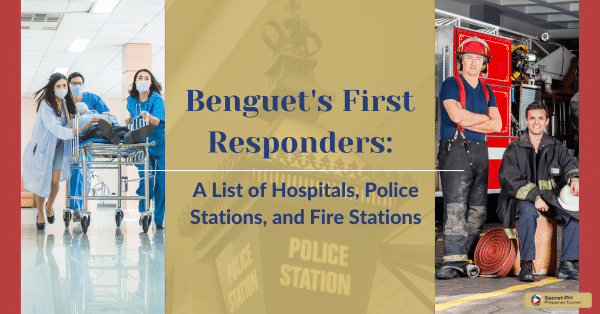With advancements in technology and the proliferation of digital media, people are increasingly seeking ways to help others in times of need. There is no better time than now to know more about the emergency services of the Philippines and how individuals can be part of its effort.
Ways to support include donating funds, volunteering time and skills, raising awareness, and supporting organizations that provide emergency assistance. By supporting emergency services, we can ensure they are equipped to respond effectively to emergencies.
The Philippines’ emergency services offer many resources that not only benefit those in crisis but also create a safer environment for everyone.
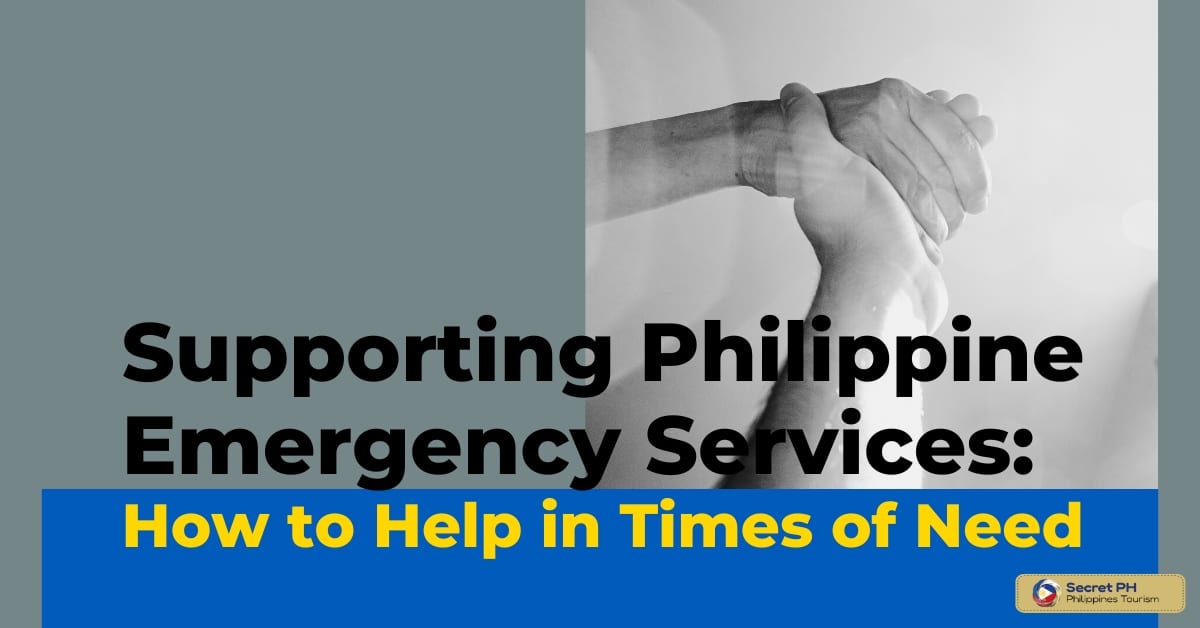
Understanding the Current Situation of Emergency Services in the Philippines
The Philippines is a country prone to natural disasters such as typhoons, earthquakes, and volcanic eruptions. In times of crisis, the country’s emergency services play a crucial role in providing aid and support to affected communities. However, the current situation of emergency services in the Philippines is a cause for concern.
Despite the efforts of the government and non-government organizations, the country still faces several challenges in terms of emergency response and preparedness. Some of these challenges include limited resources, outdated equipment, and a shortage of trained personnel.
As a result, emergency services in the Philippines struggle to effectively respond to emergencies, particularly in rural and remote areas.
Additionally, the COVID-19 pandemic has further strained the country’s emergency services. With the sudden increase in demand for medical support, emergency services are facing a shortage of personal protective equipment, medical supplies, and hospital beds.
The pandemic has also highlighted the need for the government to invest in strengthening the country’s emergency response capabilities.
It is crucial to understand the current situation of emergency services in the Philippines to appreciate the importance of supporting these services.
By working together, the government, organizations, and the community can help address the challenges faced by emergency services and ensure that they are equipped to respond to emergencies effectively.
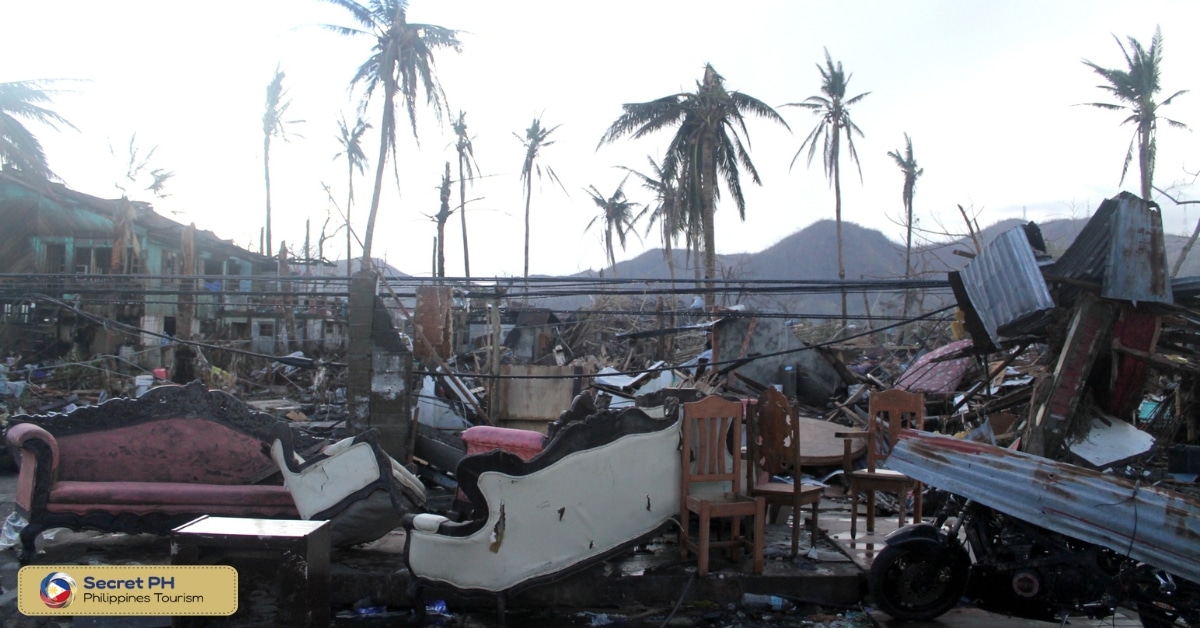
The Importance of Supporting Emergency Services
The Philippines is a country that has been in the news for natural disasters, poverty levels, and political unrest. As such, it is essential to recognize the importance of supporting emergency services in this nation.
Emergency services are life-saving operations that often provide immediate relief to those affected by disaster situations or other urgent circumstances. These services can be delivered by both government and non-governmental organizations.
The primary role of emergency services is to provide quick and efficient responses to disasters, accidents, or other emergencies. First responders, such as firefighters and paramedics, need to be properly resourced in order to perform their duties effectively.
They must have access to the right equipment such as vehicles, supplies, and medical supplies. In addition, they need to be properly trained in order to respond quickly and efficiently to emergency situations.
The government has a responsibility to ensure that emergency services are adequately funded and resourced. However, due to the current economic climate, many governments are struggling to provide the necessary funding.
This is where non-governmental organizations can play a vital role. By supporting emergency services in the Philippines, these organizations can help to ensure that the country is better prepared to deal with disasters and other urgent circumstances.
Aside from providing financial assistance, non-governmental organizations can also provide specialized training for first responders. This enables them to respond quickly and effectively and increases their chances of saving lives.
Additionally, non-governmental organizations can also offer assistance in improving the infrastructure of emergency services in the Philippines. This includes providing adequate housing and medical facilities, as well as ensuring that proper communication systems are in place.

Ways to Support Emergency Services in the Philippines
Emergency services in the Philippines play a crucial role in providing aid and support during times of crisis. There are several ways in which individuals and organizations can support these services to ensure that they are equipped to respond effectively to emergencies.
- Donating Funds: Financial support is crucial in helping emergency services acquire the resources and equipment they need to perform their duties. There are various organizations that accept donations for emergency services in the Philippines.
- Volunteering Time and Skills: Those with relevant skills, such as medical professionals, rescue workers, and engineers, can volunteer their time and expertise to support emergency services. Volunteering can be a direct way of providing assistance during crises.
- Raising Awareness through Social Media: Social media can be a powerful tool in raising awareness about the current situation of emergency services in the Philippines and the importance of supporting these services. Sharing information and updates can help mobilize support from the wider community.
- Supporting Organizations that Provide Emergency Assistance: There are several organizations that provide emergency assistance in the Philippines. Supporting these organizations, through donations or volunteering, can help ensure that emergency services have the resources they need to respond effectively to emergencies.
By supporting emergency services in these ways, individuals and organizations can help ensure that these services are equipped to respond effectively to emergencies and provide the aid and support that communities need in times of crisis.
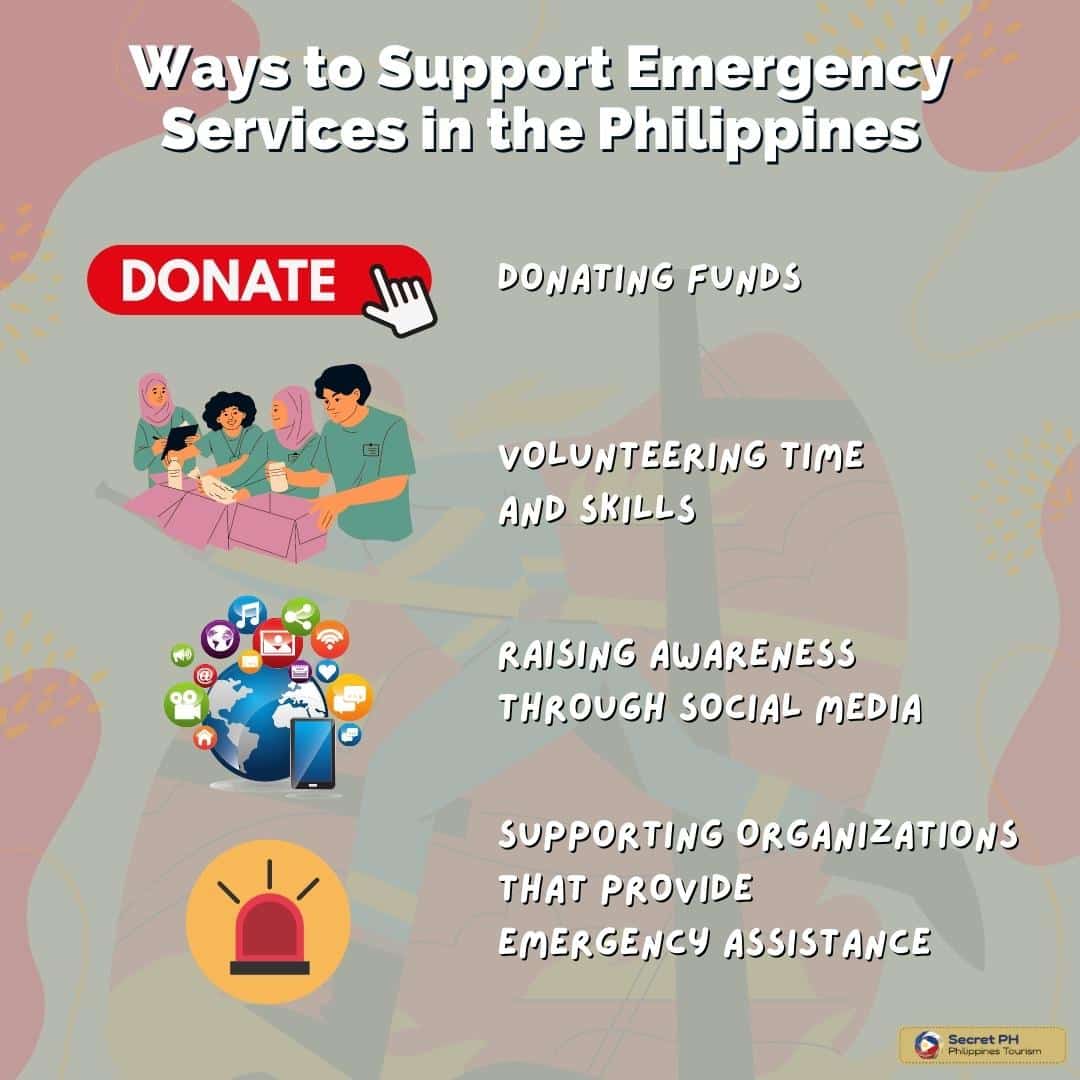
Best Practices for Supporting Emergency Services during Crises
Crises happen unexpectedly and can often cause widespread damage, loss of life, and displacement of people. In the Philippines, crises such as typhoons, earthquakes, and volcanic eruptions are relatively common.
It is important for the government and various aid organizations to have well-established protocols. They can support emergency services during these times of great need.
Here are some best practices for providing emergency services during crises in the Philippines:
- Establish a Coordination and Response Center: This center should be responsible for coordinating the response of all government institutions. It includes non-governmental organizations (NGOs) and international aid agencies. It should also serve as the main point of communication with the media and other stakeholders.
- Create an Essential Supplies List: This list should include all essential items that are needed to provide relief in times of crisis, such as water, food, medical supplies, and shelter materials. It is important to ensure that these items are available in sufficient quantities at locations where they can be most effectively utilized.
- Provide Adequate Training: All personnel involved in providing emergency services should receive proper training and certification so that they can respond quickly and efficiently to crises. Additionally, specialized teams should be established for dealing with specific types of disasters, such as fires or floods.
- Increase Infrastructure Preparedness: The infrastructure necessary to provide emergency services should be improved and maintained. This includes having backup power sources in place, ensuring that communication lines are properly connected and working, and making sure that medical facilities are adequately equipped and staffed.
- Establish a Reliable Funding Source: Crises can often cause significant financial strain, so it is important to have a reliable source of funding to support the relief efforts. This can come from both government and non-governmental sources and should be allocated in an effective and transparent manner.
The Philippines is vulnerable to many natural disasters and other crises. It is essential for the government and various aid organizations to have appropriate protocols. They are in place for providing emergency services during these times of need.
By following the best practices outlined above, they can more effectively support those affected by crises and help to reduce the devastating impacts on people’s lives.
The government and NGOs should continue to work together in order to ensure that emergency services are adequately resourced, prepared, and funded in times of crisis. This will help ensure that the Philippines is better able to respond quickly and effectively during times of disaster.
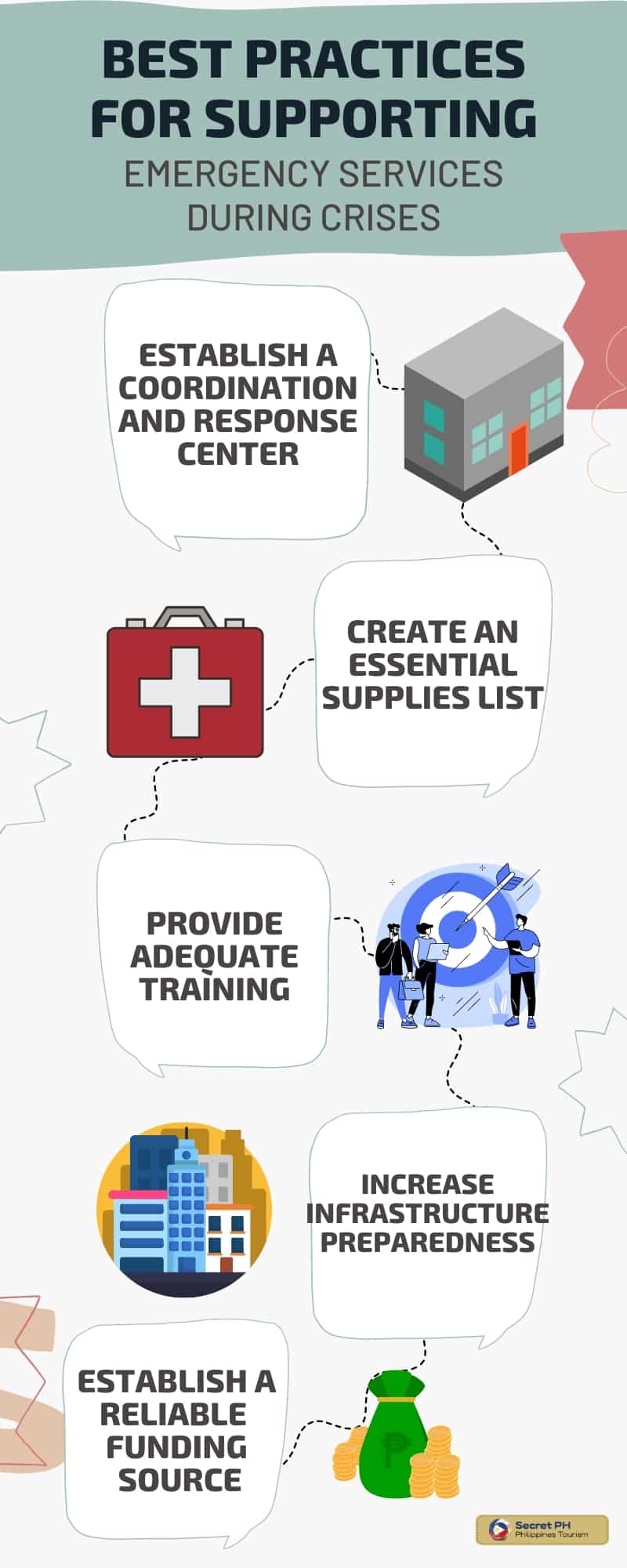
The Power of Community in Supporting Emergency Services
The Philippines is a country that faces numerous natural disasters, poverty levels, and political unrest. In these times of great need, it is essential for the government and various aid organizations. This can help to have well-established protocols in place for providing emergency services.
There is also tremendous power in the community to support these services as well.
By working together, communities can provide a great deal of assistance in supporting emergency services in the Philippines. One way that communities can do this is by organizing. It takes part in fundraisers to help fund various relief efforts.
These funds can be used to purchase essential supplies. It includes food and medical supplies or improves infrastructure and communication systems. Additionally, communities can help by volunteering their time and resources to support emergency services during times of crisis.
This includes providing transportation, housing, or medical help to those affected by disasters or other urgent circumstances.
The communities also have an important role in raising awareness and advocating for better emergency services.
Furthermore, the communities can help to ensure that the government and various aid organizations are adequately funded and resourced.
Organizing workshops or seminars on disaster preparedness can help to educate people about how to prepare for and respond to disasters effectively.
Overall, it is essential to recognize the power of the community in supporting emergency services in the Philippines. By working together, communities can provide financial, physical, and psychological support to those affected by disasters or other urgent circumstances.
This enables emergency services to respond quickly and efficiently, increasing their chances of saving lives. Additionally, through raising awareness and advocating for better resources, communities can help ensure that the country is better prepared.
It is important for all stakeholders to recognize the importance of the community in supporting emergency services in the Philippines. This will help ensure that the nation is better equipped to respond quickly and effectively during times of crisis.

In conclusion
In conclusion, Philippine Emergency Services truly need the help of its citizens in order to continue their essential work of providing aid during times of disaster, injury, or emergency.
Supporting them can be done through volunteerism, donations, and having a better understanding of how these services function. Having a good network and ample resources will be instrumental in making rapid response times available.



